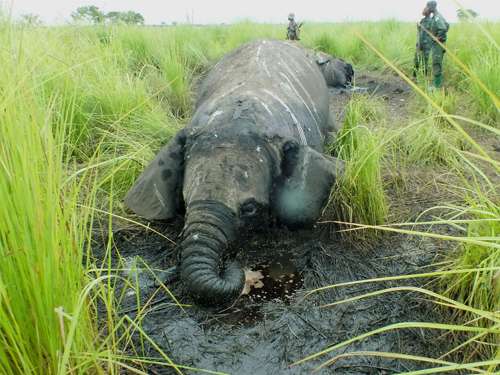Garamba National Park under attack from armed poachers in DRC

Garamba National Park, in the Democratic Republic of the Congo (DRC) is experiencing a poaching crisis, authorities and conservationists have announced.
African Parks, the management body of not only Garamba, but many other national parks across Africa, has intensified its anti-poaching efforts in eastern DRC to counter the poaching onslaught that has beset the park in the past two months.
A total of 78 elephants have been poached since mid-April, representing about 4% of the total population.
In mid-May, African Parks reported that 33 elephants had been killed in the five weeks prior, indicating a concerted attack on the park's elephant population.
Despite strengthened anti-poaching efforts, the total has now risen to 78 elephants in the past two months, with at least nine of them shot from a helicopter.
Park rangers have reported that in least one incident, hand grenades were used against them by Sudanese poachers, and poachers are now slaughtering for more than ivory – latest reports have confirmed a nauseating new trend for the brains of elephants, along with tusk and genitals, are also being removed.
All elephants are now in danger, bulls, matriarch and calves.
In mid-May, African Parks reported that 33 elephants had been killed in the five weeks prior, indicating a concerted attack on the park's elephant population.
Despite strengthened anti-poaching efforts, the total has now risen to 78 elephants in the past two months, with at least nine of them shot from a helicopter.
Park rangers have reported that in least one incident, hand grenades were used against them by Sudanese poachers, and poachers are now slaughtering for more than ivory – latest reports have confirmed a nauseating new trend for the brains of elephants, along with tusk and genitals, are also being removed.
All elephants are now in danger, bulls, matriarch and calves.
Froment said that much of the poaching was being conducted by a new wave of LRA insurgents emanating from the thickly-forested Azande Domaine de Chasse (hunting zone) to the west of the park.
Unlike previous encounters with the LRA, in which their weapons were old and ammunition limited, these groups have brand new weapons and ample supplies of ammunition.
The second threat comes from South Sudanese poachers, some of them wearing military uniforms, entering the park from the north-east. "In one encounter, hand-grenades were used against our anti-poaching team in an exchange of fire that last 45 minutes," said Froment.
The third threat is from poachers using an unidentified helicopter. Nine of the recently poached elephants had bullet wounds to the top of their heads and back and had been shot with military precision.
In two recent attacks by helicopter, the tusks were removed with chainsaws and the brains and genitals were also targeted.
These attacks are similar to a military-style helicopter attack two years ago that left 23 elephants dead in Garamba.
The escalated counter-poaching measures being rolled out by African Parks and ICCN (The Congolese Institute for Nature Conservation) include:
Collaboration with the regional military task force, which is being supported by AFRICOM (The United States Africa Command)
The establishment of forward operating bases at strategic points in the park and the manning of choke points to close down known poaching access routes
The immediate construction of new roads, bridges and pontoon crossings across the park in order to facilitate the broader deployment of anti-poaching teams
The extension of the park's airstrip network and the intensification of aerial surveillance by the park's two aircraft
Bullet-proof reinforcement of trucks used to transport the anti-poaching teams as well as the park's aircraft
The extension of the current limited communications network throughout the park.
In addition, a helicopter is being urgently sought for the rapid deployment of anti-poaching units in and around the park.
Last year, in anticipation of an escalation in poaching, African Parks invested heavily in anti-poaching equipment, communications systems, training and informer networks at Garamba, as well as training a specialised Rapid Response Unit to respond swiftly to severe poaching threats.
Thalia Liokatis, DRC Programme Coordinator with Fauna & Flora International, has just returned from the park, and added, "Garamba contains the largest remaining elephant population across this entire region of Africa and has therefore become a major poaching target.
African Parks and the ICCN, with their partners including AFRICOM, NGOs and local communities are determined to take whatever measures necessary to protect the elephants – and the rangers who are also in grave danger by protecting them.
"If we don't act now and support the park in their efforts, we will lose the last elephants."
Provided by Fauna & Flora International



















